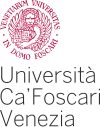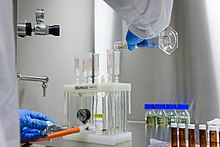Ca' Foscari University of Venice
Università Ca' Foscari Venezia | |
 Ca' Foscari and Palazzo Giustinian | |
Latin: Venetiarum universitas in domo Foscari | |
| Type | State-supported |
|---|---|
| Established | 6 August 1868 (1868-08-06) |
| Rector | Michele Bugliesi |
| Students | 21,000[1] |
| Location | Venice, Italy 45°26′04″N 12°19′35″E / 45.4345°N 12.3265°E / 45.4345; 12.3265Coordinates: 45°26′04″N 12°19′35″E / 45.4345°N 12.3265°E / 45.4345; 12.3265 |
| Website | unive.it |
 | |

Ca' Foscari-Aula Baratto

San Giobbe Campus

San Sebastiano Campus

Detail of a scientific laboratory of Santa Marta Campus
Ca' Foscari University of Venice (Italian: Università Ca' Foscari Venezia) is a public university in Venice, Italy; it is usually known simply as Università Ca' Foscari. Since its foundation in 1868 it has been housed in the Venetian Gothic palace of Ca' Foscari, from which it takes its name. The palace stands on the Grand Canal, between the Rialto and San Marco, in the sestiere ofDorsoduro.
The institute became a university in 1968.[2] It currently has eight departments and almost 21,000 students.[1] It is one of the highest ranked universities in Italy, ranking 5th in 2017 out of 89 universites.[3][4]
Contents
1 History
2 Organisation
3 Rankings
4 Research
5 Nobel's School
6 Alumni
7 See also
8 References
History
The institution was founded as the Regia Scuola Superiore di Commercio ("royal high school of commerce") by a Royal Decree dated 6 August 1868, and teaching commenced in December of the same year. The idea of establishing such a school had arisen after the annexation of the Veneto to the new Kingdom of Italy in 1866, and was promoted by three people in particular: the Jewish political economist Luigi Luzzatti, later Prime Minister of Italy; Edoardo Deodati, senator of the Kingdom of Italy and vice-president of the province of Venice; and the Sicilian political economist Francesco Ferrara, director of the school for its first thirty years.[2]
The school was the first institute of higher education in commerce in Italy,[5] and was from the outset conceived as a national rather than a regional institution; it had a diplomatic arm to prepare commercial consular staff for overseas service, and was also a training college for secondary school teachers of commercial subjects. Foreign languages were taught from the start. The school was modelled on the Institut Supérieur de Commerce d'Anvers, founded in 1853 in Antwerp, Belgium.[2]
Following the establishment of a national syllabus for university teaching in 1935, the Istituto Superiore di Economia e Commercio di Venezia, as it was by then called, was authorised to teach and award four-year laurea degrees.[6] In 1968 it obtained university status, and the name was changed to Università degli Studi di Venezia.[2]
Organisation
The university is divided into eight departments:[7]
- Economics
- Philosophy and cultural heritage
- Management
- Environmental science, computer science and statistics
- Molecular science and nanosystems
- Linguistic and comparative cultural studies
- Humanities
- Asian and Mediterranean African studies
Rankings
Ca' Foscari is subsequently ranked among the best universities in Italy, ranking 5th in 2017 out of 89 universities[8][9].
In 2017 Ca' Foscari's economics department was ranked as Italy's 3rd best, surpassed by University of Bologna and University of Padua[10].
The QS World University Ranking by subject has placed Ca’ Foscari of Venice among the top 150 universities in the world for ‘Arts & Humanities’ and ‘Languages’, and it is among the top 200 for ‘History’. ‘Economics’ has kept its place among the top 250 in the world.[citation needed]
The University is also the third state university in Italy for the quality of research according to ANVUR ratings, the National Agency for the Evaluation of University Research Systems.[citation needed]
Five Ca’ Foscari departments have been awarded additional funding by the Italian Ministry for education for a total of 35 million euros over 5 years, to which another 13.5 million has been made available by the University.[citation needed]
Research
According to the university's strategic plan, Ca' Foscari will funnel significant resources into these six discliplines for the next 4-year period:[11]
Science of Complexity
The transdisciplinary study of complex systems generates innovative solutions to the most pressing scientific and societal challenges facing the world today.
Digital Humanities
New digital technologies help to reveal new meaning in the world around us and create new fields of research such as the digital humanities and conservation science. The innovative approaches these technologies afford change the way cultural heritage is studied, preserved,restored, managed, disseminated and even created.
Social Innovation
Ca’ Foscari aims to break down the barriers that inhibit social participation, to reduce inequality and to promote integration,inclusivity and justice and improve healthcare by means of well-designed public policy.
Cross-cultural Relations
Comparative cultural and area studies provide the theoretical band conceptual basis for addressing some of the most burgent challenges of this century, such as radicalisation, migration and integration into increasingly multicultural and multilingual societies both within and beyond the European Union.
Green Growth
To help create a more sustainable future, Ca’ Foscari is developing nature-based solutions aimed at improving resource and energy efficiency, enabling green technologies (including nanotechnologies) and promoting sustainable growth in the maritime sector.
Innovation Management
Ca’ Foscari is investigating new frameworks and tools such as economic resilience, the circular economy, systemic and interactive innovation, bio-based products and multi-actor approaches.
Nobel's School
The celebration of 150 years[12] since Ca’ Foscari University Venice was founded brings some outstanding guests to take the stage at the Venetian University: six Nobel Prize Winners will give lectures to the University students throughout 2018.
Some of the personalities from around the world that have distinguished themselves in various fields of knowledge for their research, discoveries and inventions, for works of literature and working towards world peace will become part of the Ca’ Foscari community themselves. They will be lecturers for the degree programmes of the disciplines they have been awarded for and that define our University: economics and literature. A surplus value that Ca’ Foscari wants to give to its teaching, a one of a kind education that is unique to students, the heart and soul of Ca’ Foscari.
The Nobel lectures include:
Wole Soyinka, Nobel Prize Winner for Literature in 1986
Robert Merton, Nobel Prize Winner for Economics in 1997
Amartya Sen, Nobel Prize Winner for Economics in 1998
Robert Engle, Nobel Prize Winner for Economics in 2003
Mario Vargas Llosa, Nobel Prize Winner for Literature in 2010
Muhammad Yunus Nobel Prize for Peace in 2006
Martin Karplus Nobel Prize for Chemistry in 2013
Alumni
Some notable alumni of the university includes:
Giuseppe De'Longhi, businessman[13]
- Enrico Dallavecchia, businessman[14]
Roberto Meneguzzo, banker and investor[15]
Renzo Rosso, businessman, founder of the clothing brand Diesel[16]
Michele Boldrin, economist[17]
Paolo Costa, economist and politician[18]
Carlo Carraro, economist and Ca' Foscari's sitting president[19]
Ugo La Malfa, politician[20]
Flaminio Piccoli, politician[21]
Lilli Gruber, politician, author, journalist and TV-personality[22]
Barbara Frale, historian[23]
Paul Watzlawick, philosopher and psychologist[24]
Damiano Michieletto, opera director[25]
Massimiliano Frani, pianist[26]
Damiano Michieletto, theatre director[27]
See also
- List of universities in Italy
References
^ ab Regione ateneo: VENETO; Ateneo: "Ca' Foscari" di Venezia; Anno accademico: 2012/2013. Ministero dell'Istruzione, dell'Università e della Ricerca: Anagrafe Nazionale Studenti. Accessed March 2014.
^ abcd Giannantonio Paladini (1996). Profilo Storico dell'Ateneo (in Italian). Venice: Università Ca' Foscari; cited at Profilo storico. Archived 18 July 2008.
^ "Ca' Foscari al nono posto nel ranking del Sole 24 Ore | Ca' Foscari Alumni". Ca' Foscari Alumni. Retrieved 2018-09-13..mw-parser-output cite.citation{font-style:inherit}.mw-parser-output q{quotes:"""""""'""'"}.mw-parser-output code.cs1-code{color:inherit;background:inherit;border:inherit;padding:inherit}.mw-parser-output .cs1-lock-free a{background:url("//upload.wikimedia.org/wikipedia/commons/thumb/6/65/Lock-green.svg/9px-Lock-green.svg.png")no-repeat;background-position:right .1em center}.mw-parser-output .cs1-lock-limited a,.mw-parser-output .cs1-lock-registration a{background:url("//upload.wikimedia.org/wikipedia/commons/thumb/d/d6/Lock-gray-alt-2.svg/9px-Lock-gray-alt-2.svg.png")no-repeat;background-position:right .1em center}.mw-parser-output .cs1-lock-subscription a{background:url("//upload.wikimedia.org/wikipedia/commons/thumb/a/aa/Lock-red-alt-2.svg/9px-Lock-red-alt-2.svg.png")no-repeat;background-position:right .1em center}.mw-parser-output .cs1-subscription,.mw-parser-output .cs1-registration{color:#555}.mw-parser-output .cs1-subscription span,.mw-parser-output .cs1-registration span{border-bottom:1px dotted;cursor:help}.mw-parser-output .cs1-hidden-error{display:none;font-size:100%}.mw-parser-output .cs1-visible-error{font-size:100%}.mw-parser-output .cs1-subscription,.mw-parser-output .cs1-registration,.mw-parser-output .cs1-format{font-size:95%}.mw-parser-output .cs1-kern-left,.mw-parser-output .cs1-kern-wl-left{padding-left:0.2em}.mw-parser-output .cs1-kern-right,.mw-parser-output .cs1-kern-wl-right{padding-right:0.2em}
^ "Classifica Censis Economia 2017: le migliori università italiane". SOS Studenti (in Italian). 2017-07-27. Retrieved 2018-09-13.
^ Kaplan, Andreas (2014). "European management and European business schools: Insights from the history of business schools". European Management Journal. 32: 529–534. doi:10.1016/j.emj.2014.03.006.
^ Cesare Maria De Vecchi di Val Cismon, for Vittorio Emanuele III (28 November 1935). Norme relative agli insegnamenti che debbono essere impartiti nelle Università e negli Istituti superiori, Regio decreto 28 novembre 1935–XIV n. 2044 (in Italian). Gazzetta Ufficiale del Regno d'Italia. 284 (6 December 1935): 5565.
^ Università "Ca' Foscari" Venezia (in Italian). Ministero dell'Istruzione, dell'Università e della Ricerca. Accessed March 2014.
^ "Ca' Foscari al nono posto nel ranking del Sole 24 Ore | Ca' Foscari Alumni". Ca' Foscari Alumni. Retrieved 2018-10-23.
^ "Classifica mondiale, l'università Ca' Foscari è risultata il quinto ateneo in Italia". VeneziaToday. Retrieved 2018-10-23.
^ "Classifica Censis Economia 2017: le migliori università italiane". SOS Studenti (in Italian). 2017-07-27. Retrieved 2018-09-05.
^ "Strategic Plan 2016-2020" (PDF).
^ "Celebrazioni 150 anni Università Ca' Foscari Venezia".
^ "Giuseppe De'Longhi". Forbes. Retrieved 12 May 2015.
^ "Terms of Service Violation". www.bloomberg.com. Retrieved 2018-09-05.
^ "Palladio, quo vadis? Relazioni, amici e ambizioni di Roberto Meneguzzo - la Repubblica.it". Archivio - la Repubblica.it (in Italian). Retrieved 2018-10-23.
^ Rosso, Renzo (2011). Be Stupid: For Successful Living. Venezia: Rizzoli. p. 32. ISBN 978-0-8478-3758-8.
^ "Michele Boldrin | Department of Economics". economics.wustl.edu. Retrieved 2018-09-05.
^ "COSTA Paolo - Unive". www.unive.it (in Italian). Retrieved 2018-10-23.
^ "CARRARO Carlo - Unive". www.unive.it (in Italian). Retrieved 2018-10-23.
^ MIRENO, BERRETTINI, (2010). La Gran Bretagna e l’Antifascismo italiano. Diplomazia clandestina, Intelligence, Operazioni Speciali (1940-1943). Italy. OCLC 890908714.
^ "PICCOLI, Flaminio in "Dizionario Biografico"". www.treccani.it (in Italian). Retrieved 2018-10-23.
^ "Gruber, maestra nel maltrattare gli ospiti sgraditi". ilGiornale.it (in Italian). Retrieved 2018-10-23.
^ Gręźlikowski, Janusz (2016-06-08). "Roman Walczak, Sede vacante come conseguenza della perdita di un ufficio ecclesiastico nel Codice di Diritto Canonico del 1983, Città del Vaticano, Libreria Editrice Vaticana, 2015, ss. 330". Teologia i Człowiek. 32 (4): 177. doi:10.12775/ticz.2015.058. ISSN 2391-7598.
^ "Paul Watzlawick | Istituto di Psicoterapia Interazionista Psicopraxis". www.psicoterapiainterazionista.it (in Italian). Retrieved 2018-10-23.
^ "Damiano Michieletto". ROH. Retrieved 18 June 2015.
^ Crawford, Richard (2002), "Porgy and Bess", Oxford Music Online, Oxford University Press, retrieved 2018-10-23
^ "Il Cafoscarino Damiano Michieletto sul tetto di Salisburgo". Ca' Foscari Alumni. Retrieved 2018-10-23.
Cite error: A list-defined reference named "eua" is not used in the content (see the help page).
| Wikimedia Commons has media related to Università Ca' Foscari. |